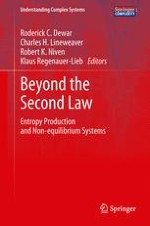2014 | OriginalPaper | Buchkapitel
5. Fluctuations, Trajectory Entropy and Ziegler’s Maximum Entropy Production Principle
verfasst von : Vladimir D. Seleznev, Leonid M. Martyushev
Erschienen in: Beyond the Second Law
Verlag: Springer Berlin Heidelberg
Aktivieren Sie unsere intelligente Suche, um passende Fachinhalte oder Patente zu finden.
Wählen Sie Textabschnitte aus um mit Künstlicher Intelligenz passenden Patente zu finden. powered by
Markieren Sie Textabschnitte, um KI-gestützt weitere passende Inhalte zu finden. powered by
